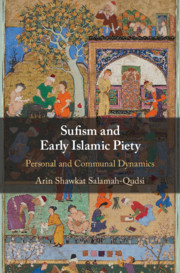Description
Sufism and Early Islamic Piety
Personal and Communal Dynamics
Author: Salamah-Qudsi Arin Shawkat
Explores aspects of the private lives and interpersonal ties, between the personal and communal domains of early Sufis.
Language: English
Subject for Sufism and Early Islamic Piety:
Approximative price 107.80 €
In Print (Delivery period: 14 days).
Add to cart
Publication date: 11-2018
330 p. · 15.8x23.5 cm · Hardback
330 p. · 15.8x23.5 cm · Hardback
Description
/li>Contents
/li>Biography
/li>
Sufism and Early Islamic Piety: Personal and Communal Dynamics offers a new story about the formative period of Sufism. Through a fresh reading of diverse Sufi and non-Sufi sources, Arin Shawkat Salamah-Qudsi reveals the complexity of personal and communal aspects of Sufi piety in the period between the ninth and thirteenth centuries. Her study also sheds light on the interrelationships and conflicts of early Sufis through emphasising that early Sufism was neither a quietist or a completely individual mode of piety. Salamah-Qudsi reveals how the early Sufis' commitment to the Islamic ideal of family life lead to different creative arrangements among them in order to avoid contradictions with this ideal and the mystical ideal of solitary life. Her book enables a deeper understanding of the development of Sufism in light of the human concerns and motivations of its founders.
Part I. Personal Narratives: Early Sufis and Family Ties: 1. Celibacy, marriage and familial commitments among early Sufis; 2. Female Sufis; 3. Maternal narratives: female Sufis as mothers; 4. Sufis as maternal uncles; Part II. Communal Narratives: Early Sufis' Modes of Operating in the Framework of Sufi Communal Lives: 5. Consensually acclaimed Sufis and lenient approaches; 6. Marginal piety: the case of Niffari; 7. Controversies and quarrel; 8. Companionship with youth (Suhbat al-Ahdath).
Arin Shawkat Salamah-Qudsi is a lecturer of Sufi and Islamic studies at the University of Haifa, Israel. Her research focuses on Medieval Sufi literature and doctrines, the role and position of women in early Sufism, Sufi autobiographies, and Sufism and society in early medieval Islam. In 2011, Dr Salamah-Qudsi obtained Ma'uf fellowship for Outstanding Arab Lecturers, the Council of Higher Education.
© 2024 LAVOISIER S.A.S.




